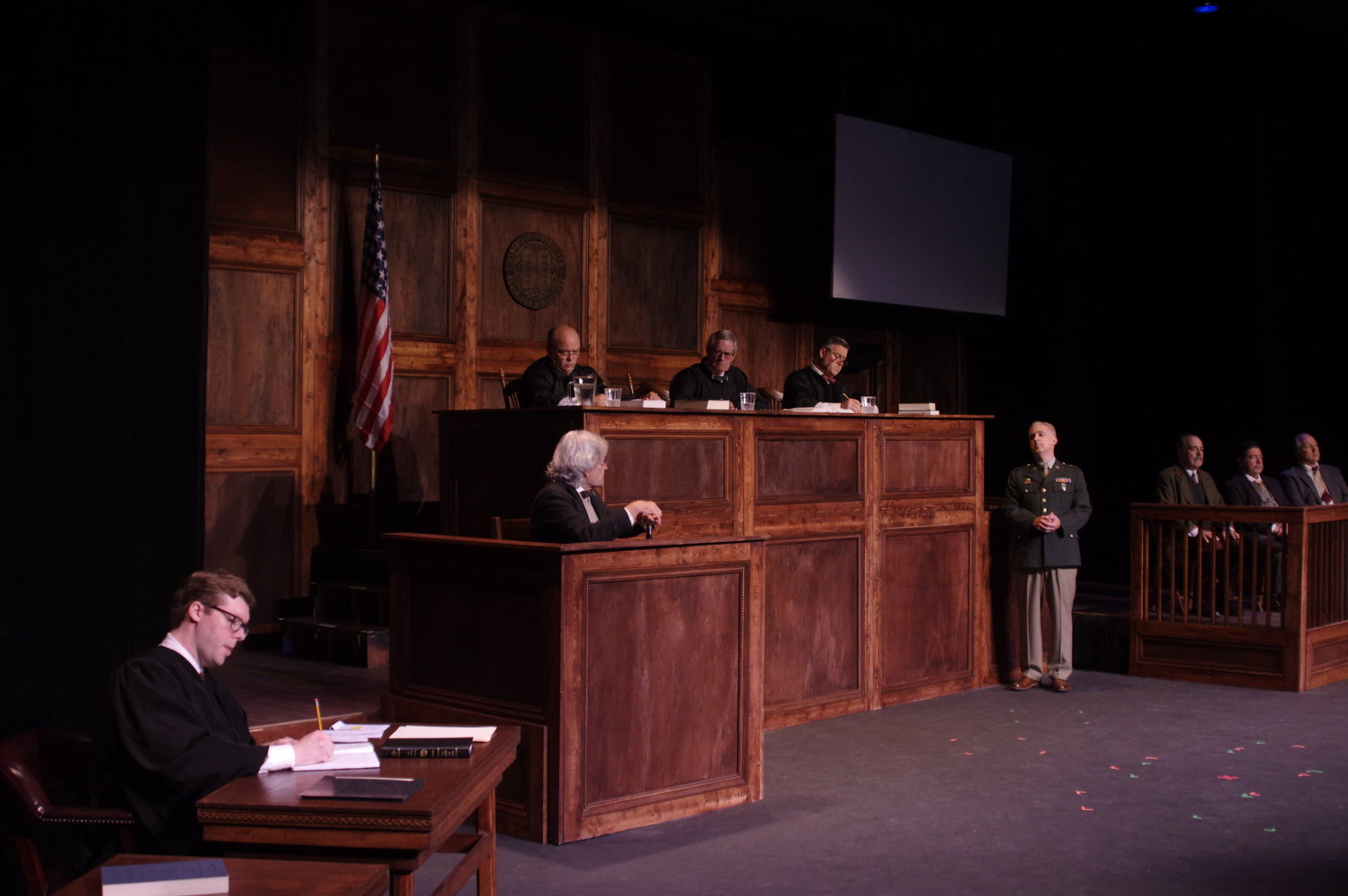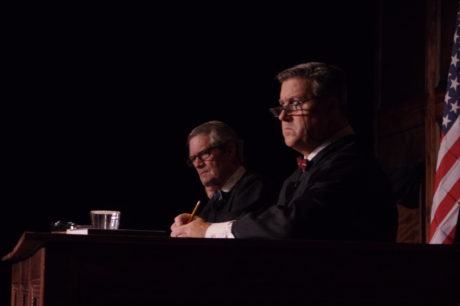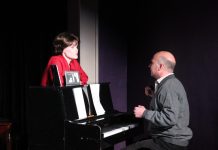Prince William Little Theatre has chosen some heavy material for their recent show. Judgment at Nuremberg, directed by Harry Kantrovich, focuses on the international military tribunals that were a result of the Holocaust. Three German judges are accused of crimes against humanity, but their crimes are mostly indirect and involve the sin of complacency and turning a blind eye rather than evil actions. The work was originally a movie from 1961, written by Abby Mann, and is a fictional version of one of the twelve tribunals that took place in Nuremberg, Germany in 1948.

The set (designed by Nick Mastrangelo and Chris Charboneau) is an impressive courtroom, with a witness box, judges’ stand, and gallery. Not every scene takes place in court, so tables and chairs are brought on downstage to represent different residences, or judges’ quarters. And there is a large screen on the stage left wall which cleverly displays the location of the next scene while the change occurs.
The scene changes are long and make the show drag quite a bit. This makes it harder for the cast to keep the energy and pace up for the show but, fortunately, the material is fascinating and holds audience focus and intrigue. And these technical aspects can improve with adjustments to lighting and allowing more of an overlap with setting pieces and actors getting into place.
Aaron Talley plays Colonel Parker, the Prosecutor for the trial. Talley’s character is hellbent on finding and punishing every last person involved with the Nazi Party. But Parker’s mission to serve justice in the name of humanity seems to have pushed him to forget his own. Talley plays the bull-headed character well and demonstrates the idea that a person can be right and wrong simultaneously
Those who stand accused are Ernst Janning (Robert Beard), Frederick Hoffstetter (Keith Scarborough), and Emil Hahn (Don Richardson) but the main focus is on Janning, a brilliant and admired judge. He is not an antagonist, but neither is he the protagonist. Beard plays Janning with an unbending pride in his accomplishments and stature, but over the course of the play he evolves, and the audience discovers that this impressive and seemingly innocent intellectual has demons plaguing him. The testimony he gives in the second act is worth the price of admission alone. Beard infuses his speech with the passion of a man split in two by the belief that his intentions were pure but resulted in unforgivable consequences.
Judge Haywood (Richard Fiske) is the lead judge and struggles with finding a firm guideline on determining right or wrong when dealing with that expansive gray area between guilt and innocence. Fiske plays Haywood very naturally and his character resonates with many today who struggle with the same basic question.
Making Haywood’s attempt to find clarity even more difficult is his growing friendship with Frau Bertholt (Terri Ritchey), the widow of a General who was executed as a result of a previous tribunal. Ritchey portrays Bertholt’s struggle with managing her grief, while playing hostess to the men who caused her that grief, with grace and dignity. Bertholt finds herself working to show that Germans are good people and should not all be judged by the ruling party that took the world by storm.

The material in Judgment at Nuremberg focuses on the meaning of justice and the difficulty in assigning blame for atrocities that cannot ever be made right. Who is responsible? Where does the line between morality and nationality lie? And should a court be able to condemn a person who never directly committed any wrong but chose self-preservation over doing what was right for his fellow man?
The play doesn’t directly answer any of these questions. And the similarities between the show and current issues, with our heated political climate, are striking.
The show is a bit long and there are images shown during the court scenes that are disturbing so families should keep that in mind for young ones. But Prince William Little Theatre’s production of Judgment at Nuremberg is an important one. Important for understanding what human beings are capable of. As a reminder to always have a means of perspective beyond our own. And for realizing that right and wrong is relative and humanity must not be forgotten in the journey for justice.
Congratulations to cast and crew of Judgment at Nuremberg for this emotional mammoth of a show. History must never be forgotten, if we are to avoid repeating it.
Running Time: Two hours and 40 minutes, with one 15-minute intermission.
Judgment At Nuremberg, presented by Prince William Little Theatre, plays through October 20, 2019, at the Gregory Family Theater, Hylton Performing Arts Center, 10960 George Mason Circle, Manassas, VA. Purchase tickets online.
Captain Byers, Edgar Johnson; Judge Ives, Walter Stewart; Judge Norris, Michael Clendenin; Rolfe, Matthew Scarborough; Mrs. Halbestadt, Leslie Ann Ross; Maria Wallner, Tammy Peters; Dr. Wickert, Michael Mehaffey; General Merrin/Gueter, Kurt Gustafson; Rudolph Peterson, Peter Ponzini; Elsa Lindnow, Janet Devine Smith; Narrator/Waiter, Justin Moreland
Assistant Director, Thor Matthews; Producer, Becky Gould-Levine; Stage Manager, Cana Wade; Lighting Design/Technical Director, Lisa Stewart; Sound Design, Walter Stewart; Costume Design, Susy Moorstein; Properties: Pat Jannell; Tech Assistant, Anna Johnston and Rachel Johnston




